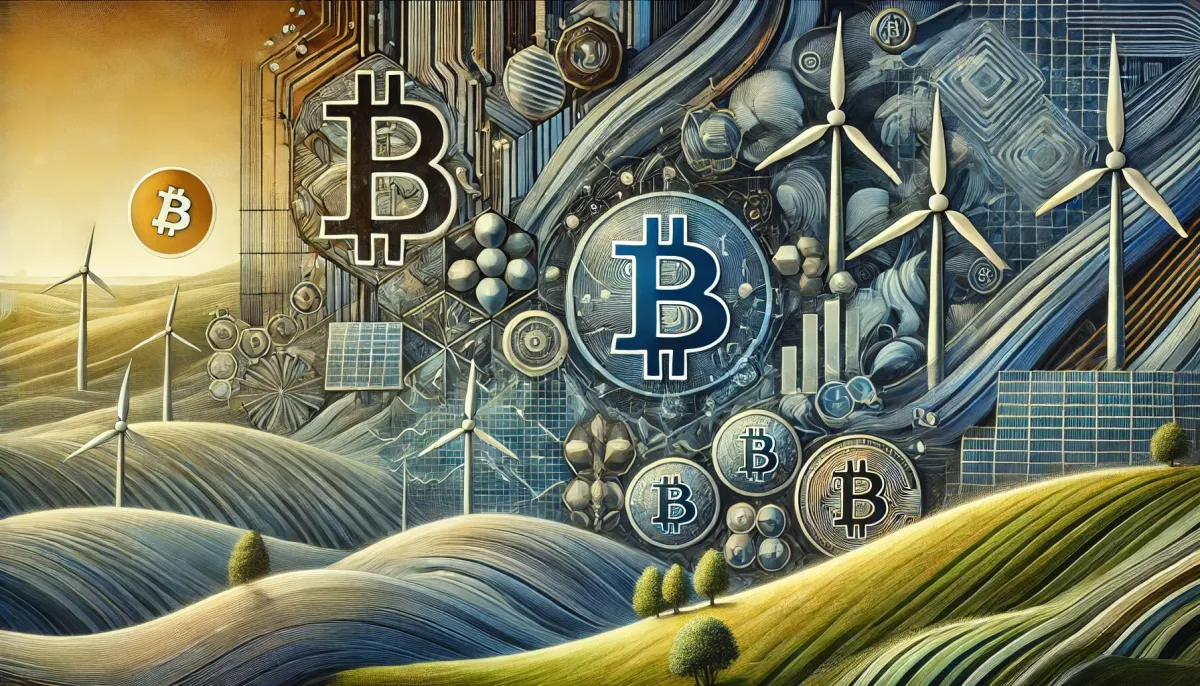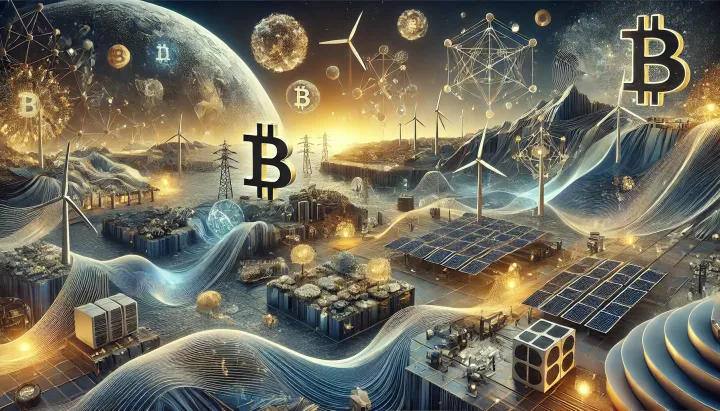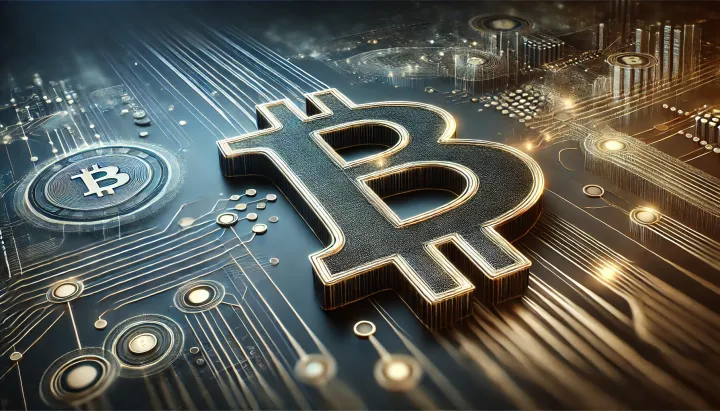Bitcoin Mining and Renewable Energy Integration in Ireland
The March 14, 2025 episode of Emerge21 with Niall Burke explores the integration of Bitcoin mining with renewable energy in Ireland, highlighting technical, regulatory, and economic challenges.

- My 'briefing notes' summarize the content of podcast episodes; they do not reflect my own views.
- They contain (1) a summary of podcast content, (2) potential information gaps, and (3) some speculative views on wider implications.
Summary
The March 14, 2025 episode of Emerge21 with Niall Burke explores the integration of Bitcoin mining with renewable energy in Ireland, highlighting technical, regulatory, and economic challenges. The discussion emphasizes optimizing surplus energy use, grid constraints, and sustainability concerns tied to Bitcoin’s proof of work. This conversation offers critical insights for policy, investment, and future technological developments.
Take-Home Messages
- Integration Opportunity: Coupling Bitcoin mining with renewable energy can optimize surplus power usage and reduce curtailment losses.
- Technical Core: Bitcoin’s proof of work links its energy consumption directly to natural processes, underpinning network security.
- Regulatory Reform: Revising energy transfer laws is crucial to enable direct, cost-effective connections for mining operations.
- Economic Impact: Strategic energy management in mining can drive local economic benefits by minimizing lost revenue.
- Educational Imperative: Clear, factual communication is needed to overcome public misconceptions and support informed policymaking.
Overview
Niall Burke outlines how Bitcoin mining can harness surplus renewable energy from wind farms, presenting it as a strategic opportunity for Ireland. He explains that Bitcoin’s proof of work, despite its high energy demands, is integral to maintaining a secure, decentralized network. This technical perspective is coupled with an emphasis on the ongoing learning required to master such a complex field.
He details the challenges of grid constraints and energy curtailment, noting that current infrastructure often forces surplus energy to go unused. Legal restrictions, such as the ban on private energy lines, further complicate direct energy transfers to mining operations. These operational challenges underscore the need for infrastructural and regulatory updates.
The discussion then shifts to economic implications, where Burke highlights the lost revenue from energy curtailment and the potential benefits of integrating mining with renewable energy sources. He stresses that aligning technical expertise with economic strategy can unlock substantial local value. The conversation stresses that a more efficient energy system can bolster both profitability and sustainability.
Finally, Burke calls for enhanced public education and proactive policy reform. He argues that transparent, fact-based communication is essential to overcome prevailing misconceptions about Bitcoin’s energy use. This comprehensive view positions Ireland to lead in both technological innovation and sustainable energy management.
Stakeholder Perspectives
- Renewable Energy Providers: Focus on reducing energy curtailment and maximizing the economic value of surplus power.
- Regulatory Authorities: Concerned with modernizing legal frameworks to support direct energy transfers and optimize grid performance.
- Bitcoin Mining Operators: Interested in reducing transmission costs and enhancing profitability by utilizing surplus energy efficiently.
- Academic Institutions: Seek to integrate emerging research on energy dynamics and Bitcoin into educational and policy frameworks.
- Local Communities: Look for sustainable economic growth driven by innovative energy utilization and technological advancement.
Implications and Future Outlook
Integrating Bitcoin mining with renewable energy could transform grid management by turning excess power into a productive asset. Upgrading infrastructure and revising regulatory frameworks are pivotal steps to enable direct energy transfers and reduce operational costs. Such changes promise to enhance both energy efficiency and the economic viability of mining operations.
The evolving landscape may stimulate strategic investments in grid technology, which in turn could drive broader technological and policy innovations. Enhanced collaboration among industry, government, and academia will be essential to address these challenges. The interplay between energy management and Bitcoin mining is poised to influence long-term economic and environmental trends.
Proactive measures to harness surplus renewable energy could serve as a model for global energy optimization. Stakeholders who adapt early will benefit from improved cost efficiencies and increased market competitiveness. Continued research and clear communication will be critical in navigating this complex and rapidly evolving field.
Information Gaps
- How can the energy demands of Bitcoin’s proof of work be balanced with sustainability goals? This question addresses the tension between network security and environmental impact, guiding future research on optimizing energy use.
- What strategies can minimize energy curtailment in renewable energy grids paired with Bitcoin mining? Investigating these strategies could unlock significant economic benefits by reducing wasted energy.
- What regulatory reforms are required to allow private energy lines for Bitcoin mining in Ireland? Clarifying these legal adjustments is crucial for enhancing direct energy transfer efficiency and reducing costs.
- What economic models can quantify the impact of energy mismatch on mining profitability and energy revenue? Robust models will inform investment and policy decisions by clearly mapping the financial interplay between energy and mining.
- What communication strategies can correct public misconceptions about Bitcoin’s energy consumption? Effective messaging is essential to foster broader acceptance and support for policy reforms.
Broader Implications for Bitcoin
Bitcoin as an Energy Optimizer
Integrating Bitcoin mining with renewable energy could transform surplus power from curtailment into a productive resource. This model offers scalability that may reduce global energy waste while enhancing overall grid efficiency. The approach could shift how energy is valued and managed, influencing market dynamics on a broader scale.
Infrastructure Evolution
Upgrading grid infrastructure to support direct energy transfers can have far-reaching impacts beyond mining. Improved networks facilitate more efficient distribution and reduce transmission costs, setting the stage for further technological innovations. This evolution is key to modernizing energy systems and achieving sustainable growth.
Regulatory Innovation
Revising outdated legal frameworks is essential to unlock new energy transfer methods and reduce operational barriers. Policy reforms could create a more dynamic interface between energy production and digital asset mining. Such regulatory innovation may serve as a blueprint for integrating emerging technologies in other regions.
Economic Realignment
Optimizing surplus energy usage through Bitcoin mining can retain local revenue and drive community economic growth. By reducing reliance on imported energy and mitigating curtailment losses, local economies could see enhanced financial stability. This economic realignment offers a sustainable path forward for regions facing similar challenges.



Comments ()